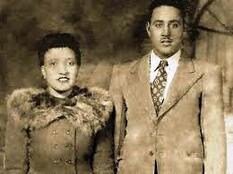
With all the attention directed toward the corona virus and importance of medical research finding a vaccine and treatment options for the illness, you would think the public would have heard, at least in passing, about Henrietta Lacks, The Immortal Woman.
No, really. She is immortal, although not in the same sense as superheros in graphic novels. Not even like some of the women we write about during Women’s History Month whose names will live seemingly forever.
Yet, because of Henrietta Lacks’ “immortality” she must have saved thousands of lives -- maybe millions – since she died in 1951. For some twenty years no one knew about her or her far reaching contribution to medical research.
EVERYONE HAS A BACK STORY
Henrietta Lacks, born Loretta Pleasant (August 1, 1920 – October 4, 1951) was an African-American tobacco farmer born in Roanoke, Virginia. I didn’t find out how her name got changed from Loretta to Henrietta, but everyone called her Hennie (or Henny).

Fast Forward.
Photo Source: sutori.com/item/1920-henrietta-Lacks Photo Source: facebook.com/afrigeneas/

January, 1951, Lacks went to the Johns Hopkins, the only hospital in the area that treated black patients, because she felt a "knot" in her womb. She was pregnant, but after the birth of her fifth child she suffered from severe hemorrhage due to a mass on her cervix.
Lacks’ doctor at Johns Hopkins, Dr. Howard W. Jones, took a biopsy of the mass for laboratory testing. She was diagnosed as having cancer of the cervix and was treated. During those treatments, doctors took tissue samples from the malignant carcinoma and from the healthy tissue without Lacks’ knowledge or permission, which was legal standard practice at that time.
Henrietta Lacks died of uremic poisoning as a result of cancer on October 4, 1951. She was thirty-one years old.
Her cell samples made their way through the system and randomly ended up with George Otto Gey, a physician and cancer researcher at Johns Hopkins. The cells from the cancerous sample eventually became known as the HeLa immortal cell line, coded with the first two letters of the first and last names, a commonly used cell line in contemporary biomedical research. No one knew the name of the cell donor.
THE CELLS THAT WOULDN’T DIE
Human cells are essential to biological research but, in the fifties, culturing human cells took a long time and a lot of effort, plus most of those cells could only stay alive for one or two days or multiply only a few times once removed from the body. This limited the research scientists could do.
Instead, Gey discovered that the cells from Lacks’ tumor did not die and could be multiplied perpetually. Because of that, he was able to develop a cell line.

Photo source: npr.org/2010/henrietta-lacks
THE CONNECTION
Henrietta Lacks’ body produced cells so prolific that they still live and regenerate in laboratories nearly six decades after her death. Scientists have grown an estimated 50 million metric tons of HeLa cells, and there are almost 11,000 patents involving these cells.
Today, many different HeLa cell lines continue to mutate in cell cultures, “but all HeLa cells are descended from the same tumor cells removed from Henrietta Lacks.”
HeLa cells enabled the growth of polio virus, allowing Jonas Salk to develop a vaccine for polio in 1952. In 1953, HeLa cells were the first human cells to be cloned successfully. In fact, Henrietta Lacks’ cell line has enabled development of vaccines, in vitro fertilization, cloning, AIDs research, and gene mapping, to mention only a few.

I found a number of current articles about Corona virus research that reference using HeLa cells in the search for a vaccine. A century after her death, perhaps the general public will learn about her invaluable contribution to medical and biochemical research.
A SECOND CONTRIBUTION
Lacks’ contribution goes beyond the medical successes. Her story eventually brought to the attention of the scientific world and the courts to the issue of balance between scientific research and the rights of individuals.
The Lacks family never knew anything about the cell line until 1975 when members were contacted by researchers asking for cell samples from other members of the family. Although Dr. Gey freely shared his research and the cell line with other scientists and researchers, and Johns Hopkins never filed for a patent or received any gain from the cells, eventually the cell line was commercialized and led to many discoveries. The Lacks family never shared in any of the proceeds.
"The Immortal Life of Henrietta Lacks" by Rebecca Skloot (2010) turned the spotlight on the situation, and “organizations that have profited from HeLa have since publicly recognized Henrietta Lacks' contributions to research. The Lacks family has been honored at the Smithsonian Institution and the National Foundation for Cancer Research.” biography.com/scientist/henrietta-lacks
Author Skloot founded the Henrietta Lacks Foundation, which provides scholarship assistance to Lacks' descendents, paying the college tuition for five of Lacks' grandchildren and great-grandchildren, several of whom have gone into science. Last but not least, the Foundation helps the Lacks family with medical bills.
“One of the great ironies of the Lacks family's struggles is that, despite her being responsible for landmark medical discoveries, many of her descendents have no health insurance.”
roanoke.com/archive/the-story-of-hela
Sources:
http://listverse.com/2018/09/08/10-incredible-women-forgotten-by-history/
https://en.wikipedia.org/wiki/Henrietta_Lacks
https://www.theatlantavoice.com/articles/celebrate-black-history-month-henrietta-Lacks-Lacks-stolen-cells-revolutionized-medical-research/
https://www.facebook.com/afrigeneas/posts/10154233920602975/
https://www.roanoke.com/archive/the-story-of-hela-roanoke-native-and-scientific-marvel-henrietta/article_a30affe0-25c7-54ad-8176-d64954408ae7.html
https://www.biography.com/scientist/henrietta-Lacks
https://www.sutori.com/item/1920-henrietta-Lacks-was-born-loretta-pleasant-on-august-1-1920-at-some-point
https://blacksthen.com/something-didnt-learn-school-true-story-henrietta-Lacks-video/
https://web.archive.org/web/20011201201650/http://www.news.harvard.edu/gazette/2001/07.19/04-filmmaker.html
https://www.refinery29.com/en-us/2016/03/105351/womens-history-month-famous-females
https://www.hopkinsmedicine.org/henriettalacks/index.html
http://henriettalacksfoundation.org/
http://rebeccaskloot.com/the-immortal-life/
https://www.npr.org/2010/12/13/132030076/henrietta-lacks-immortal-cells-live-on-in-labs
https://www.ncbi.nlm.nih.gov/pmc/articles/PMC3341241/
https://www.ncbi.nlm.nih.gov/pmc/articles/PMC5165181/
https://journals.plos.org/plospathogens/article?id=10.1371/journal.ppat.1004502
 RSS Feed
RSS Feed